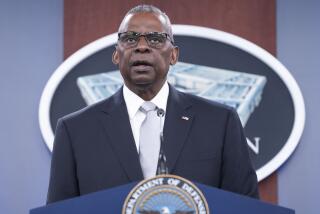Weinberger Cautious on Retaliation
- Share via
WASHINGTON — The United States is capable of responding to terrorist attacks “very quickly and very effectively” but must consider whether its use of force “will discourage and diminish terrorism in the future,” Defense Secretary Caspar W. Weinberger said Thursday.
Talking about the views of counterterrorism that have often set him apart from Secretary of State George P. Shultz, Weinberger cautioned against the use of force in a less than precise fashion and said, “I think that there are a lot of people who would get instant gratification from some kind of a bombing attack somewhere without being too worried about the details.”
One day after Shultz outlined his own views of the proper U.S. response to terrorist actions, Weinberger told a Pentagon news conference, “I think we have a responsibility to take the actions that are effective in deterring future terrorism.”
‘Haven’t Eliminated Terrorism’
But, he added, “there have been a lot of attacks made in retaliation from time to time. They haven’t eliminated terrorism or terrorist attacks on the people who made the immediate retaliation.”
In one of the most recent such raids, Israeli jets struck the headquarters of the Palestine Liberation Organization in Tunisia in early October in response to the murder of Israelis on a yacht in a harbor on Cyprus.
On Wednesday, Shultz told a Pentagon-sponsored conference on guerrilla warfare, insurgencies and terrorism that “we cannot let the ambiguities of the terrorist threat reduce us to total impotence. A policy filled with so many qualifications and conditions that they all could never be met would amount to a policy of paralysis.”
A Matter of Emphasis
On Thursday, Weinberger took pains, in response to a question, to stress that if he differs with his Cabinet colleague and fellow member of the National Security Council, those differences are perhaps more of “emphasis than anything else.” He said that if a suitable target for response to terrorist actions could be found, there would be no “hesitancy about dealing with it.”
Since the attacks by terrorists Dec. 27 at airports in Rome and Vienna, which took the lives of 19 people, the Reagan Administration has been searching for an appropriate response.
It has sought unsuccessfully to bring Canada and Western Europe into a so-far unilateral campaign of full economic sanctions against Libya, in response to what it says is evidence that the North African nation led by Moammar Kadafi provided assistance to the attackers.
‘His Own Smoking Gun’
Kadafi on Wednesday said that he would train and supply Arab guerrillas for “terrorist and suicide missions.” State Department spokesman Bernard Kalb said Thursday that Shultz, pointing to the Libyan leader’s statement, said that Kadafi is “his own smoking gun.” Last week, the Administration released a white paper that it said documented circumstantial evidence of Libya’s involvement in terrorist activities, but Administration spokesmen conceded then that there was “no smoking gun” directly tying Kadafi to the terrorist acts.
Pentagon officials said that after several days of military movements in the Mediterranean, there were no significant developments or naval activity there Thursday. The United States’ fleet there was augmented Wednesday when the aircraft carrier Saratoga and its accompanying battle group arrived from the Indian Ocean.
Pentagon officials reported Tuesday that a “picket line” of Soviet ships in the eastern and central Mediterranean were serving as an early warning line of seaborne radar stations to provide intelligence to Libya.
Weinberger frequently has remarked in public, and reportedly counseled in private, that the use of force against terrorist targets should be restricted to those targets that can be struck without putting innocent people at risk.
Must Have ‘Clear Idea’
“We have a good idea as to where some terrorist bases are,” he said. But, he added, one must have “a clear idea” before launching an attack that the targets “are indeed bases that have spawned terrorism that is directed against us.”
“A discriminate response, an appropriate response, is difficult. But it is important that we have that kind of response and we are quite capable of delivering that kind of response very quickly and very effectively,” he said.
He added, “We have to have the appropriateness of the response carefully thought out, and we have to have the basic question of whether what we are doing will discourage and diminish terrorism in the future.”
The defense secretary pointed to the interception in October by carrier-based U.S. Navy jets of an Egyptian airliner carrying terrorists alleged to have been involved in the takeover of the Achille Lauro cruise ship. The airliner was escorted by the warplanes to Italy.
“When a direct military response is required, it can be made,” he said.
More to Read
Sign up for Essential California
The most important California stories and recommendations in your inbox every morning.
You may occasionally receive promotional content from the Los Angeles Times.













